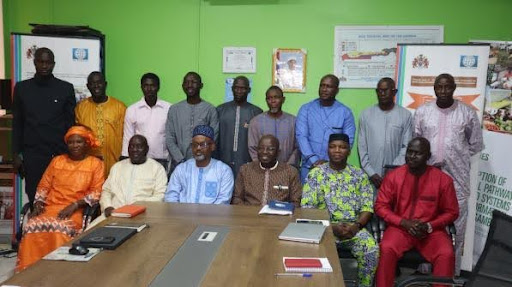By Fatou B. Cham
The Government of The Gambia through the Ministry of Agriculture, Livestock and Food Security, has launched a $1.34 million Soil Fertility Mapping project with support from the Islamic Development Bank (IsBD).
The three-year initiative aims to map soils in key agricultural areas and provide targeted fertilizer and soil management recommendations for farmers and stakeholders across the country. The IsDB will contribute 1 million USD while the Government of The Gambia will contribute 0.34 million USD towards this three-year project.
One of the project’s specific objectives is to map soils in major agricultural target areas and develop fertilizer and soil fertility management recommendations for farmers in those areas, the fertilizer industry, and other stakeholders.
Speaking at the launching ceremony, P. S. Mod Secka, MoALFS, said the newly launched project is one of the smallest project portfolios under the Ministry. But said nevertheless, the project is one of the most important ones, and said this is because it deals with the soil which is the most important factor of production that greatly influences crop productivity.
“Crop productivity in The Gambia generally remains low despite the country’s significant agricultural potential. There is a clear need for productivity enhancement, and this can be achieved through better knowledge and management of our soils,” he emphasized.
According to the P.S, by the end of the three-year implementation period, the following results are expected: better knowledge of soil properties; soil fertility; plant nutrient status, and the factors affecting soil nutrient supply; evidence-based fertilizer; soil and crop management recommendations, and site-specific fertilizer recommendations for all major crops of the country; sustained increase of yields and nutritional quality of the major crops and increased returns on fertilizer investments.
Abdoulie Touray, GIRAV’s project coordinator who also doubles as CPCU’s coordinator, said this project is unique in the sense that it aims to improve soil fertility. He said one can have good seeds or finances to procure mechanization but if the soil is poor or degraded, production will be dormant.
Dr. Arinloye Djalal, CIFOA-ICRAF’s Regional coordinator said when compared to other countries, The Gambia has made significant progress in this area. This he said is because of the effective management and the conducive policies seen in the country.
“ICRAF has been able to provide the procurement but also the instalment of a soil laboratory which is of a high international standard, because it is one of the requirements of the bank. And as we were going into negotiations, we at ICRAF needed to support the country to bring their status to national and internationally acceptable standards,” he concluded.


















